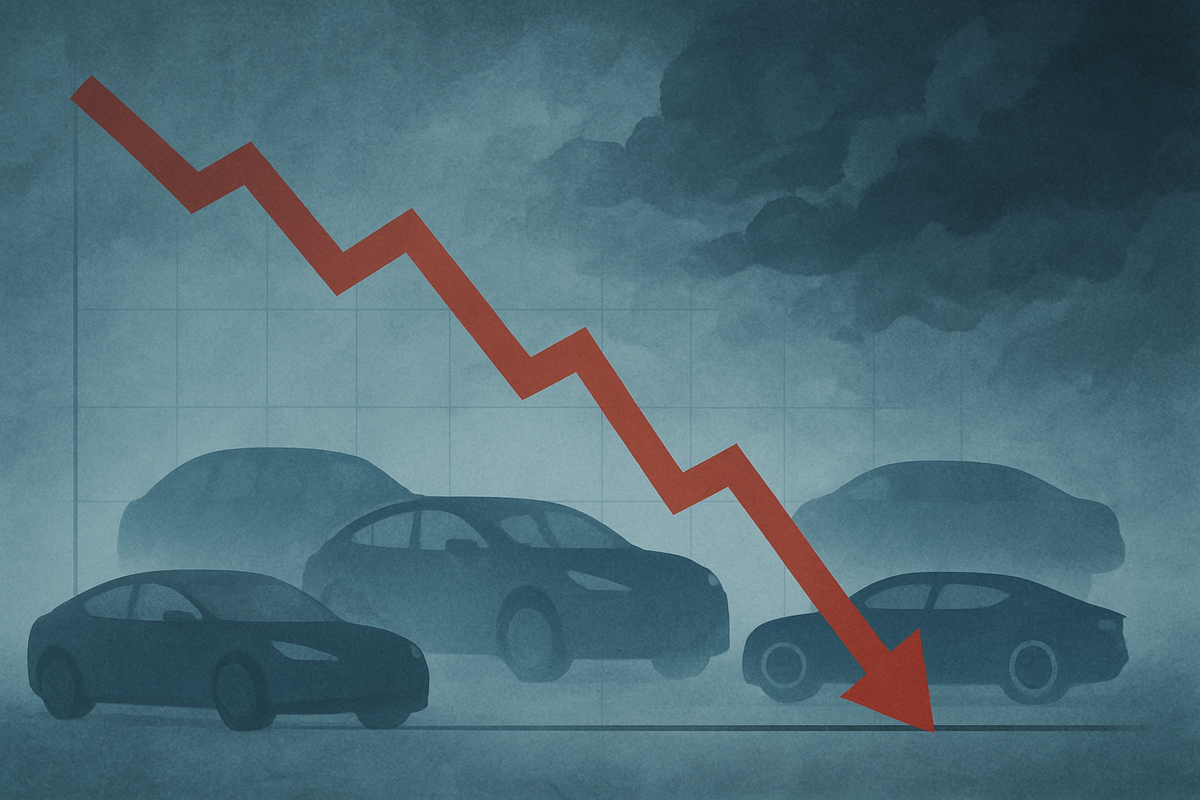
San Francisco, CA – November 21, 2025 – Shares of electric vehicle (EV) titan Tesla (NASDAQ: TSLA) experienced a significant decline today, mirroring a broader downturn across the technology sector and signaling growing investor apprehension regarding macroeconomic conditions and intensified competition. The notable dip in Tesla's valuation underscores a palpable shift in market sentiment, as investors increasingly scrutinize high-growth assets amidst persistent inflation concerns and a less forgiving interest rate environment.
This market movement reflects a cautious retreat from speculative tech investments, with analysts pointing to a confluence of factors that have converged to create a challenging landscape for even industry leaders. The immediate implications suggest a potential re-evaluation of growth stock valuations, urging a closer look at company fundamentals and market positioning in an increasingly crowded and complex global economy.
Unpacking the Day's Decline: A Confluence of Pressures
Today's downturn for Tesla (NASDAQ: TSLA) was not an isolated incident but rather a symptom of deeper market anxieties that have been brewing for months. While specific catalysts for today's sharp fall are still being assessed, the broader narrative points to several intertwined factors impacting the company and the tech sector at large.
The Federal Reserve's continued hawkish stance on interest rates, aimed at taming persistent inflationary pressures, has created a challenging backdrop for growth stocks. Higher borrowing costs for consumers directly impact big-ticket purchases like new vehicles, while increased capital costs for corporations like Tesla can slow expansion plans. Furthermore, lingering fears of a global economic slowdown or even a recession have tempered consumer spending forecasts, directly threatening Tesla's sales volume and revenue projections. Geopolitical tensions, particularly concerning trade policies and tariffs between major economic blocs, also cast a shadow, threatening supply chain stability and increasing manufacturing costs for a globally integrated company like Tesla.
Adding to the macroeconomic headwinds, the electric vehicle (EV) market has become fiercely competitive. While Tesla (NASDAQ: TSLA) pioneered the modern EV era, traditional automotive giants such as Ford (NYSE: F), General Motors (NYSE: GM), and Volkswagen (XTRA: VOW3) have significantly ramped up their EV offerings, introducing a diverse range of models that directly challenge Tesla's market share. Moreover, a formidable wave of Chinese manufacturers, including BYD (HKEX: 1211), Nio (NYSE: NIO), and Xpeng (NYSE: XPEV), are not only dominating their home market but are also aggressively expanding into Europe and other international territories, often with more budget-friendly options. This intense competition is leading to pricing pressures and a potential erosion of Tesla's historical market dominance, impacting its profitability.
Regulatory shifts also play a role. There's an ongoing debate in various governments about the future of EV subsidies. Any reduction or elimination of federal tax credits, such as those in the U.S. from the Inflation Reduction Act, could significantly increase the effective price of Tesla vehicles for consumers, dampening demand. Simultaneously, Tesla continues to grapple with complex production challenges, including the ongoing need to diversify its supply chain away from reliance on China-made components for its American vehicle production. This strategic pivot, while aiming for long-term resilience, introduces short-term operational complexities and potentially higher costs, especially for critical materials like graphite, where securing alternative suppliers can be challenging and costly. Production line changeovers at Gigafactories for new models or updates also periodically disrupt delivery schedules, impacting quarterly results and investor confidence.
Initial market reactions to these combined pressures have been swift. Today's decline in Tesla (NASDAQ: TSLA) stock has triggered a wave of cautious sentiment among investors, with some analysts reportedly re-evaluating their price targets, citing concerns over future growth prospects in a more competitive and economically constrained environment. The broader tech sell-off suggests a period of profit-taking and a shift in risk appetite away from high-valuation growth assets.
Shifting Fortunes: Who Gains and Who Loses in Tesla's Wake?
A significant downturn for Tesla (NASDAQ: TSLA) inevitably creates a ripple effect across the automotive and technology sectors, reordering the competitive landscape and shifting investor focus. While Tesla's direct suppliers face immediate headwinds, a host of its competitors stand to gain from any perceived weakening of the EV pioneer.
Among the clearest beneficiaries are the traditional automotive giants who have aggressively pivoted into the EV space. Companies like General Motors (NYSE: GM) and Ford (NYSE: F), with their rapidly expanding lineups of electric trucks and SUVs built on dedicated EV platforms, could see increased market share and investor confidence. Volkswagen Group (XTRA: VWAGY), with its extensive ID series and luxury EV offerings from Porsche (XTRA: P911) and Audi (XTRA: NSU), is also well-positioned to capture mainstream EV buyers seeking alternatives. Similarly, Asian powerhouses such as Hyundai Motor Group (KRX: 005380) and Kia (KRX: 000270), known for their competitive pricing and advanced E-GMP platform, could further solidify their positions as compelling alternatives. Even luxury brands like Mercedes-Benz Group AG (XTRA: MBG) and BMW AG (XTRA: BMW) could attract high-end EV buyers looking beyond Tesla.
Other pure-play EV startups, while potentially facing broader sector sentiment challenges, might also see opportunities. Rivian Automotive (NASDAQ: RIVN), a direct competitor in the premium electric truck and SUV segment, could attract consumers looking for alternatives to Tesla's offerings, especially if Tesla's brand appeal softens. Lucid Group (NASDAQ: LCID), operating in the ultra-luxury EV segment, might also draw investors seeking high-performance EV plays. Crucially, Chinese EV manufacturers like BYD (HKEX: 1211), Nio (NYSE: NIO), Xpeng (NYSE: XPEV), and Li Auto (NASDAQ: LI) are formidable competitors, particularly BYD, which has already surpassed Tesla in global EV sales in some quarters. A Tesla stumble could further accelerate their international expansion and market penetration.
On the losing side, companies with high direct exposure to Tesla's supply chain are most vulnerable. Specific battery cell manufacturers that heavily rely on Tesla for revenue, as well as raw material suppliers for lithium, nickel, and cobalt, could see reduced order volumes and dampened demand. While identifying specific public companies in Tesla's proprietary supply chain can be challenging, many tier-1 and tier-2 automotive component manufacturers would feel the pinch. Furthermore, investment funds and countless retail investors with substantial allocations to Tesla (NASDAQ: TSLA) stock would incur direct financial losses, potentially leading to broader market instability if widespread selling ensues. More broadly, a significant Tesla decline could trigger a sector-wide "risk-off" sentiment, impacting the valuations of other EV startups and companies developing EV-specific technologies, even if their individual performance remains robust.
Broader Implications: A Bellwether for the EV and Tech Landscape
Tesla's (NASDAQ: TSLA) market movements often serve as a bellwether for the broader electric vehicle industry and, to some extent, the entire technology sector. Today's hypothetical decline carries wider significance, suggesting a potential inflection point in the maturation of the EV market and a recalibration of investor expectations for high-growth tech companies.
This event fits into broader industry trends signaling an increasingly competitive and less forgiving EV landscape. The era of a single dominant player might be drawing to a close as legacy automakers and a new wave of startups aggressively vie for market share. If Tesla's decline is attributed to factors like softening demand or technological catch-up by rivals, it could accelerate a shift towards a more diversified EV market, where innovation and competitive pricing become paramount across a wider array of manufacturers. This also suggests that the market is becoming more discerning, moving beyond pure growth narratives to scrutinize profitability, sustainable business models, and robust supply chains.
The ripple effects on competitors and partners could be profound. While an initial "contagion effect" might cause temporary volatility across the EV sector, a sustained Tesla (NASDAQ: TSLA) decline could ultimately benefit its rivals. Investors and consumers might redirect their capital and purchasing power towards other established or emerging EV players, fostering a more balanced competitive environment. For Tesla's vast network of suppliers for batteries, components, and raw materials, a downturn could lead to renegotiations or reduced orders, potentially causing financial strain for smaller, highly dependent partners. However, the broader push towards diversified supply chains by the entire auto industry could mitigate some of these risks over time.
From a regulatory standpoint, a significant market disruption involving a major player like Tesla could prompt governments to re-evaluate their strategies for fostering EV adoption. If the decline is perceived as a slowdown in the overall EV transition, policymakers might increase subsidies, tax incentives, or investments in charging infrastructure to ensure climate targets are met. Conversely, it could also trigger scrutiny into market concentration or competition within the tech and automotive sectors. Historically, periods of significant market correction, such as the dot-com bust of the early 2000s, demonstrate how overvalued sectors can correct, impacting both leading companies and the broader industry. While Tesla's resilience is well-documented, this event could echo past automotive industry crises, forcing strategic realignments across the board.
Beyond the immediate market, this event holds implications for the future of EV infrastructure, battery technology, and autonomous driving development. A financial setback for Tesla could slow down its private Supercharger network expansion, although the widespread adoption of the North American Charging Standard (NACS) by other automakers could lead to a more robust, diversified public charging ecosystem. In battery technology, while Tesla's Gigafactories have been crucial for scaling production, a decline might impact its investment in novel chemistries. However, the global race for better batteries involves numerous players, ensuring that overall progress in battery tech will likely continue, albeit with potentially shifted leadership. For autonomous driving, Tesla's ambitious "Full Self-Driving" (FSD) project, which has faced both technological and regulatory hurdles, might see a re-evaluation of its immense R&D spending. This could open opportunities for competitors like Waymo and Cruise, or for traditional automotive OEMs, to gain ground with their own, often more cautious, approaches to autonomous technology.
The Road Ahead: Navigating a New Market Reality
The notable decline in Tesla's (NASDAQ: TSLA) stock price today, November 21, 2025, signals a critical juncture for the company and the broader electric vehicle and technology sectors. The road ahead will be characterized by both short-term stabilization efforts and long-term strategic recalibrations as Tesla navigates an increasingly competitive landscape and persistent macroeconomic pressures.
In the short term, Tesla will likely implement measures to restore investor confidence and stimulate demand. This could involve further strategic price adjustments or more aggressive financing incentives to counter fierce competition, particularly from lower-priced Chinese EVs. There's also a strong possibility that Tesla (NASDAQ: TSLA) will fast-track the launch of its more affordable "Model Q" (or a similar entry-level EV), aiming to tap into a broader consumer base and drive volume growth. The company may also issue revised financial guidance, emphasizing stricter cost controls, manufacturing efficiencies, and a renewed focus on profitability across its product lines, while simultaneously leveraging its existing technological advantages in battery efficiency and its extensive Supercharger network.
Looking further ahead, Tesla's long-term strategy will likely reinforce its diversification beyond just electric vehicles, aligning with its broader "Master Plan" vision. This includes accelerating its expansion into energy generation and storage (Powerwall, Megapack, solar), advanced AI, its Full Self-Driving (FSD) technology, robotaxi services, and humanoid robots (Optimus). The success of these ventures is crucial for positioning Tesla as a diversified technology company, similar to Amazon (NASDAQ: AMZN), and could provide significant new revenue streams through subscriptions and mobility services. The company's commitment to scaling stationary energy storage production to 100 GWh annually, with ambitions to reach multiple terawatt-hours, highlights a clear path for growth in its energy segment. Global manufacturing expansion, with Gigafactories in Berlin, Shanghai, and Texas, will also continue to be key for increasing production capacity and meeting regional demands.
However, these ambitions come with significant challenges and necessitate strategic pivots. Tesla (NASDAQ: TSLA) will need to innovate further in manufacturing processes to achieve even lower production costs, especially for its affordable models, and may explore strategic partnerships with battery suppliers and autonomous driving technology firms to sustain its competitive edge and share R&D burdens. A refined go-to-market strategy, moving beyond early adopters to appeal to a more cost-conscious mainstream audience, will also be essential. This could involve more traditional advertising, expanded service networks, and directly addressing "range anxiety" and charging infrastructure concerns. Moreover, questions surrounding CEO Elon Musk's focus and leadership might necessitate a more concentrated approach to reassure investors and stakeholders.
Market opportunities will emerge, particularly in the affordable EV segment and the continued demand for robust charging infrastructure. Continued technological advancements in battery efficiency and autonomous driving will remain critical differentiators. Yet, the challenges are equally formidable: intensified competition leading to sustained price wars, persistent macroeconomic headwinds dampening overall car sales, and the ongoing need to address charging infrastructure gaps and raw material supply volatility. Regulatory shifts and geopolitical risks also loom large, potentially impacting EV sales and global strategy. The outcome for Tesla could range from a resilient recovery, where its diversified strategy and affordable models gain traction, to a period of stagnation if competitive pressures and macroeconomic factors outweigh its innovative efforts. A more radical scenario could see an accelerated diversification, transforming Tesla primarily into an AI/robotics company with an automotive division, fundamentally altering its market identity.
Wrap-up: A Critical Juncture for Tesla and the Broader Market
Today's hypothetical downturn in Tesla's (NASDAQ: TSLA) stock price is a pivotal moment, underscoring the dynamic and increasingly challenging environment for the electric vehicle industry and high-growth technology stocks. It serves as a crucial "reset" for market expectations, moving beyond an era of growth-at-all-costs towards one where profitability, sustainable business models, and realistic valuations take precedence.
The key takeaways from this event revolve around the intensifying competition in the EV sector, where price wars continue to erode margins, and the broader macroeconomic headwinds, including persistent inflation and interest rate uncertainty, which are impacting consumer spending and tech sector valuations. The decline in a bellwether stock like Tesla immediately raises questions about the valuations of other major tech and growth companies, highlighting the concentration risk within market indices.
Moving forward, the EV industry will likely see further consolidation, with companies that can effectively manage costs, innovate, and adapt to evolving consumer preferences gaining an edge. Legacy automakers, with their diversified portfolios and established manufacturing prowess, may continue to gain ground against pure-play EV startups. For the broader tech sector, this event reinforces the need for a more discerning investment approach, where fundamentals and clear paths to profitability become paramount over speculative narratives. Global economic trends, including central bank policies, geopolitical stability, and consumer discretionary spending, will continue to heavily influence market sentiment and growth prospects.
The lasting impact of such an event could be a more mature and rational investment environment. For Tesla, this could be a defining moment, pushing it to either double down on its diversified technology vision or risk becoming a less dominant player in a rapidly fragmenting automotive landscape.
Investors should closely monitor several key indicators in the coming months. For Tesla (NASDAQ: TSLA), future earnings reports, delivery numbers, operating margin trends, and updates on new product launches or advancements in FSD will be critical. Across the EV industry, watch for sales figures and profitability from competitors and overall EV demand trends. In the tech sector, observe the performance and valuations of other mega-cap tech companies, particularly those heavily invested in AI. Finally, macroeconomic data, including inflation rates, employment reports, and consumer spending figures, along with any shifts in global trade policies, will be paramount in shaping market sentiment and growth prospects.
This content is intended for informational purposes only and is not financial advice





